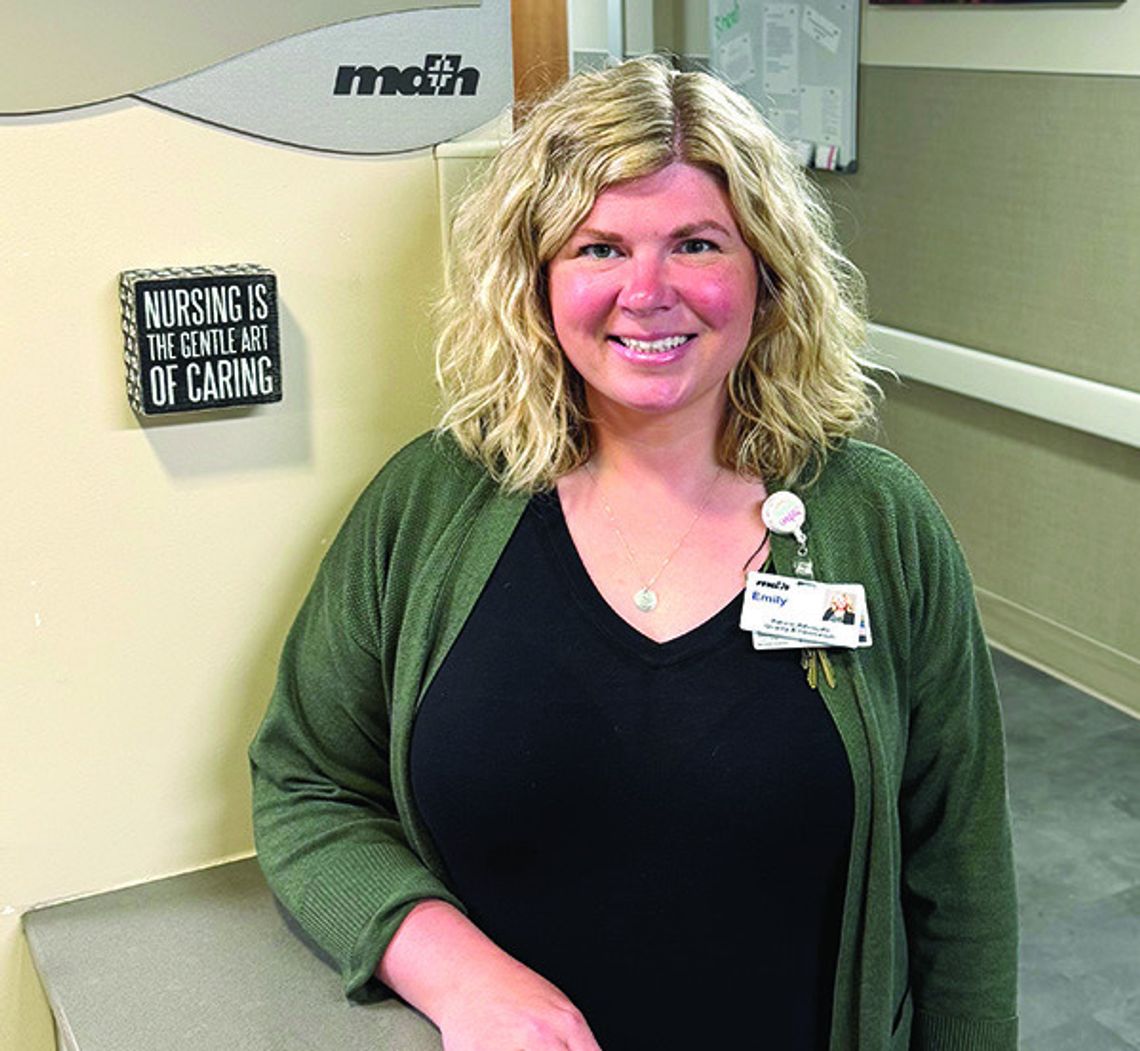Emily Alden’s satisfaction with her job at McDonough District Hospital is helping improve patients’ satisfaction with their experiences at the health care facility.
“I’ve loved this place from Day 1, and it just keeps getting better,” said the hospital’s patient advocate, who has been on the job for two years. “Every opportunity that I get to work with a patient or family member to help them through an anxious moment is so important. I appreciate the opportunity to add to the patient experience and enjoy when I am able to make a difference.”
A patient advocate helps patients by listening to their concerns, supporting their perspectives, helping them understand their care and improving their hospital experiences. Alden responds to issues ranging from cold spaghetti on a meal tray to patients feeling like their caregivers aren’t listening to them. Then she works with appropriate hospital leadership to resolve concerns.
It’s a dual role that benefits patients and the hospital.
“I’m the bridge between the medical work and being a patient,” Alden said. “I’m grateful to have the perception of being a patient myself not long ago and have a strong understanding of the patient perception. It is my goal to always hang onto that perception while advocating for patients.”
Addressing patient concerns Hospitals can stir fear of the unknown, whether it’s being unfamiliar with the sights, sounds and smells of the facility or learning a diagnosis. Having someone on staff to address concerns can calm fears and boost confidence in the care being provided.
“I round on patients to check in and make sure their stay is OK,” Alden said. Because she is the only one who holds the patient advocate title, Alden can’t visit every patient so she relies of hospital staff to call her on patients’ behalf when necessary.
“When I advocate for patients, I take pride in relaying the patient concerns exactly as it was from the patient and sharing that with the department director,” she said. “I feel that patients appreciate having a neutral party, and that’s what I have dedicated myself to be.”
For example, when Alden receives a comment about patient care, she shares it with the appropriate department director. The director investigates the matter and provides a response. That response is communicated with the patient when possible. Resolution of issues involving employee behavior cannot be shared because of confidentiality. All patient complaints are tracked.
Measuring patient satisfaction Assessing patient satisfaction is an important part of Alden’s job.
“We have established processes to review patient feedback from multiple sources, ensuring that we fully understand our patients’ concerns and continuously work to improve the care and services we provide each day,” Alden said. Like many hospitals, MDH works with the healthcare performance- improvement company Press Ganey to conduct patient-satisfaction surveys. Press Ganey sends the surveys, collects the responses and returns the results – including statistical summaries – to MDH. Alden receives the information and shares the data with department directors and hospital administrators.
Survey responses are anonymous unless patients choose to add their contact information within the survey.
“If a patient leaves their name and number, we have the ability to go in and take a look at who completed it and contact them,” Alden said. “Usually, I will work with department directors on comments that require a response.”
Alden sends department-specific results to the respective leaders. Then she works with department directors to identify trends and issues, and develop solutions for improvement.
Providing service excellence
“When we think about ways to ensure patients are satisfied with their visits, it starts and ends with the staff who are directly involved in their care,” Alden said. “We have a caring and compassionate team staff that advocates for patients at all levels of the organization.”
Service excellence begins with the Golden Rule – treat others as you wish to be treated – and continues with education on empathy and communication techniques to help ensure patients understand their care and feel valued. Alden provides education to new employees during orientation and continuing education at department meetings and through email tips to reinforce the patientfirst message.
“The best thing about being a part of the MDH team is that everyone cares about patients and has a strong service-excellence mindset,” she said. “We strive to provide the highest quality care to everyone that walks through our doors, and we work as a team to ensure we respond quickly to patient concerns.”
Finding work satisfaction
Born in Detroit, Michigan and raised in Geneva, Illinois, a Chicago suburb, Alden came to west-central Illinois to attend Monmouth College. She transferred to Western Illinois University to complete her communication degree in 2009.
Alden admits she didn’t have a plan after college.
“I went back home for a summer and came back down here,” she said. “I had my friends here for almost five years, and I grew accustomed to the change of pace Macomb offered, which I appreciated more than being up north. Everything is fast-paced up there. I like the hometown feel.”
Before coming to MDH, Alden worked in the finance industry, beginning her career in loans and advancing to branch manager in banking. She also gained experience in investments, and began studying to earn a license for stock trading to support a financial advisor. During this time, a friend who worked at MDH told her about an open position for a patient advocate.
“I always felt as though something was missing,” she said. “I think finance is important and I was able to help people in my career, but there was a component lacking – like that empathetic, social work-type feel. I applied for this job because I felt that maybe I was going to find that little piece of what was missing. It turns out, it was better than I even imagined.”









